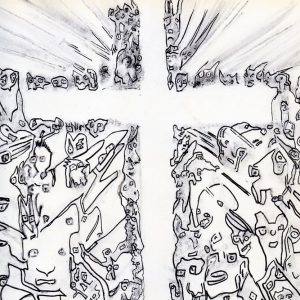Hyperion

Epigraph (John Keats, Hyperion: A Fragment, Book III. (1819))
This excerpt from Keats’s “Hyperion” resonates with a profound sense of melancholy and existential questioning. The speaker feels weighed down by an inexplicable sadness, yearning for a lost sense of freedom and purpose. Keats’s use of language and imagery captures a deep sense of longing and the pain of unrealised potential.
The Great Physician
This poem explores themes of longing, fulfilment, and the search for meaning in life. The imagery of driving through a storm towards a lake symbolises a journey through turmoil towards peace or clarity. The poem’s conclusion, suggesting that true resolution comes through a form of metaphorical death, hints at the idea of rebirth or transformation as a path to overcoming inner conflicts.
Hyperion
This poem is a complex meditation on divinity, knowledge, and the human condition. The references to a ‘super brain’, ‘Divine Holograms’, and the ‘Central Sun’ are particularly evocative, suggesting a search for a higher understanding or connection. The poem grapples with the nature of God and the human quest for enlightenment, blending scientific and spiritual imagery in a compelling way.
Dark Fire
“Dark Fire” delves into the intensity of passion and love, using vivid imagery to describe a deep and consuming relationship. The poem transitions from joyous celebration to a darker, more reflective tone, questioning the lasting impact of such intense emotions. The use of contrasting images like ‘bright burning firework’ and ‘dark fire’ effectively captures the complexities of love and desire.
You’re Still End
This poem reflects on identity, destiny, and the inexorable march towards an end, possibly death. It speaks to the shared human condition, the unavoidable nature of change, and the search for meaning in the face of these realities. The poem’s sombre tone suggests a resignation to fate, while also acknowledging the power of human emotions and experiences.
Lumpenproletarian
Here, the poet offers a critical view of societal structures and class distinctions, using the term ‘chavs’ to represent a marginalised group. The poem seems to critique both societal views of this group and the group’s own internal struggles. The imagery of ‘hooded monks’ and ‘dark-skinned and cold’ individuals suggests a complex interplay between societal perceptions and personal identity.
Striving in the Path of God
This poem explores themes of moral judgment, societal control, and the struggle between higher ideals and base instincts. The imagery of ‘invisible policemen’ and the ‘edifice teeters’ suggests a conflict between societal order and personal freedom. The poem’s intense and sometimes violent imagery reflects a deep engagement with the challenges of living a moral life in a complex world.
Overall, these poems by Harry Matthews offer a rich exploration of human emotion, existential struggle, and the quest for meaning. They blend personal introspection with broader social commentary, using vivid imagery and powerful language to engage the reader on multiple levels.
Hyperion
- Publisher : Harry Matthews (29 Dec. 2020)
- Language : English
- Paperback : 78 pages
- ISBN-10 : 1838349812
- ISBN-13 : 978-1838349813
- Dimensions : 12.85 x 0.48 x 19.84 cm
Harry Matthews
un poète et peintre
